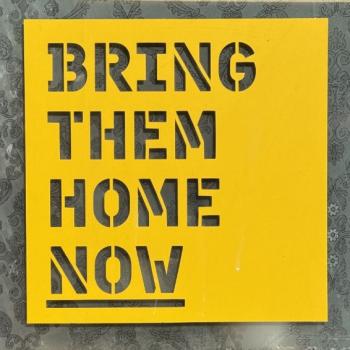Instead of talking past each other or ignoring each other, can we start listening? I’ll go first by listening to one of my detractors.
I’m a collector of interesting social media tidbits, always taking screenshots of memes, copying and pasting comments that I find intriguing or eye-opening. I keep them in a file on my desktop and skim through them every once in a while, to remind me how people explain themselves and what they believe. In the semi-anonymity of the internet, people are sometimes more frank than they would be in person.
(No, it’s not perfect. For one thing, there should be a font for sarcasm, am I right?)
I have to admit that even though I spent most of my life as an evangelical, I struggle to understand how evangelicals think, now that I’m no longer in that camp. I think many progressives would agree that we just don’t see how y’all can believe as you do, and I’m pretty sure many evangelicals are equally baffled about us.
Each group talks as though the other group is stupid, or apostate, or both, but both sides are made up of mostly intelligent people (stop those eyerolls, people!) who want to do the right thing. And we read the same Bible, so how do we come up with opposite interpretations?
Learning curve
Recently, an evangelical reader – I’ll call him Dave – left a comment that is helping me actually start to get it. It was the first time I heard an actual explanation, instead of a label – usually it’s “Marxist” or “socialist” (he actually did label me “racist,” but he also made some thought-provoking statements).
Dave was responding to this piece, in which I call out evangelicals for neglecting the needy and marginalized (I write about that quite a bit).

What I’d like to do here is reach across the aisle in an attempt to genuinely understand someone I don’t agree with, and hopefully to initiate some dialogue. I hope by doing this that we can begin to understand and respect each other better – in other words, be more Christlike toward each other.
Will I change any minds? Maybe not. Will anyone change my mind? Probably not. But listening and respect are worthwhile actions anyway.
In the spirit of aisle-reaching-across, below is a quote from my article (which wasn’t always gentle), followed by a quote from Dave’s comment. I’ll then try to unpack his comment, and respond with (hopefully) kindness.
I invite fellow progressives to join me in trying to respect and understand the other side, and I invite evangelicals to participate by patiently helping us – and also trying to understand us.
Tough talk to evangelicals
Here’s what I said (read the full post here):
[Speaking about evangelicals] Based on our chosen theology, we refuse to acknowledge what the Bible says about the oppressed and the immigrant. We ignore what Jesus said about loving our neighbors. We pretend that he is not the Prince of Peace.
We willfully shut truths out of our minds for the sake of our conservative agenda. Of course, we don’t see it that way – we just see ourselves being faithful to God. And in our “godliness” we refuse to entertain any other point of view than “God’s.”
It takes a special kind of denial to know Jesus and still approve of children in cages. people of color being killed by law enforcement, and thousands of Americans dying every week from Covid.
We use the Bible, of course, to “sanctify” our paradigm. Cherry-picked Bible verses control our rhetoric – and cause us to cling for dear life to positions that are clearly against Jesus’ teachings. We withhold compassion, grace, and gentleness and call ourselves followers of Christ.
But when did Jesus do anything even remotely like taking children away from their parents? When did he refuse food to anyone who was hungry? When did he shrug off oppression or prejudice?
Tough talk from an evangelical
Dave responds,
Your false theology has a very obvious Leftist political propaganda content to it.
I suggest you stick to biblical context, remembering that God’s HIDDEN wisdom (1Corinthians 2:7), MYSTERIES (Matthew 13:11), should be SPIRITUALLY understood (1Corinthians 2:14, Colossians 1:9).
So who are the strangers Christians should welcome? They’re the spiritual strangers from the covenants of promise (Ephesians 2:12), who are spiritual strangers from the household of God (Ephesians 2:19).
And we welcome these lost souls (strangers) by preaching the gospel as Jesus called us to do (Mark 16:15).
Who are the hungry/thirsty? They’re lost souls who lack Christ our spiritual food and drink (1Corinthians 10:3,4). Lost souls are the spiritually naked as they lack the garment of salvation, the robes of righteousness (Isaiah 61:10).
All these spiritually needy lost souls are helped when Christians obey Christ’s call that we preach the gospel to them (Mark 16:15).
What I’m hearing
I appreciate that Dave took the time to comment. It helps me understand how he can ignore the physical needs of the poor.
If Dave’s comment is representative of most evangelicals, I can see how evangelicals would be less supportive of welfare, for example. (That word if is important. Evangelicals are individuals. We shouldn’t stereotype – just as we progressives don’t want to be stereotyped. #goldenrule)

So, if I understand this correctly, evangelicals (or at least Dave) believe Jesus was speaking in purely symbolic terms. When he said “hungry,” “thirsty,” “naked,” “in prison,” he meant spiritually hungry, thirsty, naked, imprisoned.
The only thing spiritually needy people need is to have their spiritual needs met. I get that.
If that’s the case, then we don’t need to attend to people’s physical needs. That rings a bell for me.
In my evangelical days, I remember the consensus was that the only mission work worth supporting was purely evangelistic. That made sense to me because I saw people as being in two camps: saved and unsaved. (Dave called this “God’s binary view of humanity.”)
According to this perspective, if you’re saved, you’re fine. Start saving other people. If you’re unsaved, there’s only one thing to be done for you: save you. We really didn’t prioritize people’s physical needs. Because “what shall it profit a man, if he shall gain the whole world, and lose his own soul?” (Mark 8:36)
This is why evangelicals are unmoved when progressives say things like,
Did Jesus call on us to criticize the hungry for not getting a job, or to feed the hungry? Does Jesus want us to call the thirsty “welfare queens,” or give the them a drink? Does Jesus want us to send the stranger back where he came from, or invite him in? And the naked, sick, and imprisoned – ignored, or cared for?
Let us not forget: these are the choices that make us welcome or unwelcome in the Kingdom (Matthew 25:31-46).
I felt, when I was an evangelical, that there must be limits to our generosity. We weren’t doing welfare queens any favors by perpetuating their gravy train. Free stuff makes people lazy, and the Bible says, “if any would not work, neither should he eat” (2 Thess. 3:10). This makes it biblical to not help the poor.
So, there seems to be a paradigm in evangelical circles that says, “spiritual needs aren’t the first thing – they’re the only thing.” It’s all about the Great Commission.
(I guess that’s why, after I became a progressive, my evangelical friends weren’t interested when I organized solidarity rallies at the local mosque. It was during Trump’s Muslim Ban, and I wasn’t going to evangelize Muslims, but to hug them. I don’t remember any evangelicals coming to those events.)
To my evangelical friends, am I accurately representing your mindset? Does my description of my own evangelical days ring a bell for you?

Renewal of my mind
As I became progressive, many changes were happening at once, but I remember what stood out for me was a fact I’d never acknowledged before: people come into the world with baggage. If you’re born into grinding poverty, it takes more than “asking Jesus into your life” and “pulling yourself up by your bootstraps” to rise out of poverty.
I learned that our country has created a system (many, including me, would add “on purpose”) in which disadvantage is very hard to shake.
You want to get off food stamps and out of public housing? Get a job. You want a job? Get training. You want training? Get a car and a babysitter and books and a computer. And good grades.
If you somehow manage to do all those things, and you get hired for a decent job (which isn’t a sure thing), your paycheck might be high enough to get you off food stamps and out of public housing, but not high enough to afford the more expensive apartment, the ongoing child care while you go to work, the nice clothes you need for your job, school debt, car payments…
I used to work at a self-storage facility, and I’d get calls at the end of every month from people being evicted from their apartments. They needed to store their furniture while they moved in with relatives and got back on their feet.
Sometimes I heard their stories (these are real, and just a few of many):
- I got a flat tire, and couldn’t afford to fix it, so I couldn’t get to work and got fired. (Don’t assume they didn’t try to get to work – nobody wants to move in with relatives!)
- My mom has cancer, and I had to miss work to take her to doctor appointments and I got fired. (Don’t assume they didn’t try to find mom a ride – nobody wants to move in with relatives!)
- I got injured at work, and my boss didn’t report it properly, so I didn’t get workman’s comp and got fired because I can’t do the work, due to my injury. (Don’t assume they didn’t do everything they could to rectify this – nobody wants to move in with relatives!)
Many people are one flat tire or doctor’s appointment or accident away from homelessness. HOME. LESS. NESS, Christians.
Basically, the system dooms/encourages the poor to stay in poverty. When I learned this, I realized that we must tend to the physical needs of the poor, and we must work to fix the system.
And we must not blame the poor for being poor.

WWJD (What Would Jesus Do)?
Remember that time when 5,000+ hungry people were hanging around Jesus and the disciples (Matt.14)? Jesus did not preach to them – he had compassion on them and healed their sick. Then this happened:
As evening approached, the disciples came to him and said, “This is a remote place, and it’s already getting late. Send the crowds away, so they can go to the villages and buy themselves some food.”
Jesus replied, “They do not need to go away. You give them something to eat.”
The rest is history. He filled their bellies. Again, no record of preaching to them, only food. In Matthew 15, he did the same thing for 4,000+: healing and feeding.
In many other places, Jesus cared for physical needs without addressing spiritual needs. Sometimes he addressed only spiritual needs. But I can’t think of a single story in which he refused to care for physical needs.
This post too long already, so I’ll stop and ask my evangelical friends and readers: how do you respond? I ask you to be specific. Please tell me:
- Is my characterization of evangelicalism fair? What would you change or add? (In other words, help us understand better your position on poverty)
- What do you say about Jesus’ feeding and healing loads of people without addressing their spiritual needs?
No attacks, no name-calling. Let’s have an actual dialogue. (Follow it by subscribing to my newsletter!) If I have any takers, I will address your comments in a future post, and likely continue to unpack Dave’s comments soon as well. It should be interesting and informative for all of us.
(PS Like the Lego illustrations? If you do, let me know! I’ll use more!)
FEATURED IMAGE: “iPad unpacking” by ntr23 is licensed under CC BY-NC-SA 2.0













